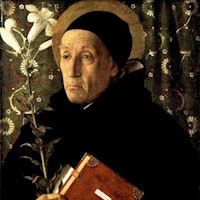You will attain oneness and blessedness in your soul’s spark, which time and place never touched.
Meister Eckhart

Your Soul’s Spark
Topic: Immanence & Transcendence
Therefore, I say, if a man turns away from self and from created things, then—to the extent that you do this—you will attain oneness and blessedness in your soul’s spark, which time and place never touched.
Meister Eckhart, whose full name was Eckhart von Hochheim OP, (c. 1260 – c. 1328) was born around the year 1260, possibly between 1250 and 1260, in the village of Tambach, near Gotha, in the Landgraviate of Thuringia, which is now central Germany, within the Holy Roman Empire. The prefix "Meister" in his name translates to "Master," signifying his scholarly prestige. His birth into nobility was initially purported, however, later examinations revealed that this notion stemmed from a misinterpretation of period archives, clarifying that his Christian name was Eckhart, with the surname von Hochheim.
Eckhart commenced his ecclesiastical journey around the age of 18, circa 1278, by joining the Dominican convent at Erfurt. His scholarly pursuits possibly led him to study at Cologne before 1280, and perhaps also at the University of Paris either before or after his time in Cologne. His commitment to the Dominican order was substantial, as he entered the order when he was 15 and later, around 1294, began his teaching career as a lecturer on the Sentences of Peter Lombard at the Dominican convent of St. Jacques in Paris.
Meister Eckhart's theological and philosophical endeavors were deeply rooted in mysticism, with a notable emphasis on the union between the individual soul and God, as expressed in his sermons both in German and Latin. His rising prominence was particularly noted during the Avignon Papacy, a period marked by increased tensions among monastic orders and diocesan clergy. Unfortunately, the latter part of his life was marred by accusations of heresy, leading to a trial by the local Franciscan-led Inquisition, and subsequently by Pope John XXII. Despite these challenges, Eckhart's teachings continued to resonate through his disciples like Johannes Tauler and Henry Suso, and his mystic philosophy continues to garner attention and appreciation in contemporary religious and academic circles.
Meister Eckhart, [Star, Jonathan, Translator, Two Suns Rising (New York: Bantam, 1991)].

Meister Eckhart
Theme: Our Soul

About This Meister Eckhart Quotation [Commentary]
Meister Eckhart begins with a clear turning: “if a man turns away from self and from created things.” This is not escape from life, but a release of what grips the heart—“self” and “created things.” Eckhart is precise and proportional: “to the extent that you do this,” something opens. Then “you will attain oneness and blessedness,” not first in outward conditions, but inwardly, where the soul can receive what is already there.
He names that inward center “your soul’s spark,” and he describes it with exactness: it is the place “which time and place never touched.” Eckhart’s sequence matters: turning away comes first, then “oneness and blessedness,” because the “spark” is not made out of changeable circumstances. What is “never touched” by time and place is not reached by more effort in time or by finding the right place; it is met by turning away from what distracts and returning to the soul’s own center.
Eckhart’s promise also quiets spiritual strain. “You will attain” does not mean forcing an experience; it means that as one “turns away from self and from created things,” one stops covering over the “spark.” In that “oneness and blessedness,” the soul is gathered beyond possessiveness and comparison, and closer to God than the restless self can manage. This is Intimate Divinity: “oneness” in the “soul’s spark,” “which time and place never touched,” offered as a simple, inward blessing.
Matthew Fox’s Commentary
Eckhart ’s use of “spark of the soul” is a core teaching in his theology. He says: The spark of the soul is where the “now” of time encounters the “eternal now” of eternity. Eckhart says: “Take away the now of time, and you are everywhere and you have the whole of time.”
At times, Eckhart identifies the “spark of the soul” with the Holy Spirit. Sometimes he calls it the “maternity bed” where God is born. And sometimes, an “uncreated something” that links what is created in us to what is uncreated, what links God the Creator to the Godhead, which is deeper, more hidden and darker than all of creation. It links being and doing, inaction and action.
This is how the angels perceive who “perceive in a light that is beyond time and is eternal. They therefore perceive in the eternal Now.”
Eckhart recognizes that the highest part of the soul dwells in community and close companions with angels in angelic nature. Angelic nature is not in contact with time, nor is the spirit which is… free from time.
—Adapted from Matthew Fox, Meister Eckhart: A Mystic-Warrior for Our Times, pp. 189-193.
An Additional Meister Eckhart Quotation
Resources
Related Quotes
Copyright © 2017 – 2026 LuminaryQuotes.com About Us